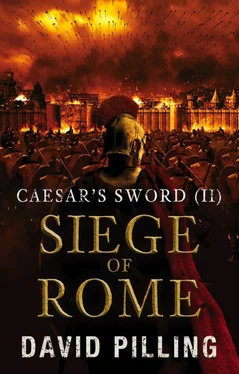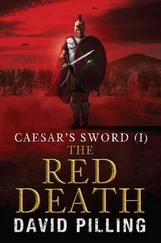David Pilling - Siege of Rome
Здесь есть возможность читать онлайн «David Pilling - Siege of Rome» весь текст электронной книги совершенно бесплатно (целиком полную версию без сокращений). В некоторых случаях можно слушать аудио, скачать через торрент в формате fb2 и присутствует краткое содержание. Год выпуска: 2013, Жанр: Исторические приключения, на английском языке. Описание произведения, (предисловие) а так же отзывы посетителей доступны на портале библиотеки ЛибКат.
- Название:Siege of Rome
- Автор:
- Жанр:
- Год:2013
- ISBN:нет данных
- Рейтинг книги:3 / 5. Голосов: 1
-
Избранное:Добавить в избранное
- Отзывы:
-
Ваша оценка:
- 60
- 1
- 2
- 3
- 4
- 5
Siege of Rome: краткое содержание, описание и аннотация
Предлагаем к чтению аннотацию, описание, краткое содержание или предисловие (зависит от того, что написал сам автор книги «Siege of Rome»). Если вы не нашли необходимую информацию о книге — напишите в комментариях, мы постараемся отыскать её.
Siege of Rome — читать онлайн бесплатно полную книгу (весь текст) целиком
Ниже представлен текст книги, разбитый по страницам. Система сохранения места последней прочитанной страницы, позволяет с удобством читать онлайн бесплатно книгу «Siege of Rome», без необходимости каждый раз заново искать на чём Вы остановились. Поставьте закладку, и сможете в любой момент перейти на страницу, на которой закончили чтение.
Интервал:
Закладка:
“Another lie,” said Photius, clucking his tongue, “are all you Britons so deceitful? You stole these daggers from Presidius, seven days ago.”
I had to think to match the name to a face. Then it came to me. Presidius was an Italian nobleman, a native of Spoleto who volunteered to join our army when Constantine took that city from the Goths.
He was said to have fallen under the displeasure of the Gothic monarch, and had only thrown in his lot with us to avoid punishment. I knew he was unpopular, and had acquired a reputation for being proud and haughty, overbearing to the lower orders and incompetent in the field.
“Presidius was a rich man, once,” Photius added, “but when our men fled Spoleto he was obliged to leave most of his treasures behind, bar a few trinkets. These daggers are by far the most valuable of his possessions. And you stole them.”
I found it difficult to keep the contempt from my voice. “First, you try and murder me on the battlefield,” I said, “then your mother sends a pair of assassins after me. By the way, I slew the guardsman you bribed, and his body lies rotting under the ground by Naples. Now you stoop to having me framed on a false charge of petty theft. For shame, Photius. Don’t you feel the slightest bit ashamed? Does that noble exterior of yours not contain a sliver of conscience?”
His face flooded with colour, but I carried on regardless. “If you were any sort of a man, which you’re not, you would order your men to remove the chains on my wrists. Then we could have it out, man to man, blade to blade, and let God decide the victor. Or are you afraid to fight me?”
This was my last – my only – throw of the dice. If Photius possessed any sense of honour, which was doubtful, he could not refuse a fair challenge to trial by combat in front of his men. Whether I could beat this active young soldier, all muscle and sinew and whipcord, was another matter, but death in combat was preferable to disgrace and execution.
Sadly, my initial judgment of his character proved correct. “Vermin such as you don’t deserve an honourable death,” he hissed, “why should I, a Roman of noble blood, consent to cross swords with a felon?”
He turned on his heel before I could taunt him any further, and we continued on our way to the Pincian Hill.
I could scarcely believe that Photius meant to drag me in front of Belisarius, just hours after our army had suffered a defeat, but there was method in his eagerness. Tired and dispirited after the day’s fighting, Belisarius might be vulnerable, and sufficiently disorientated to treat the absurd charges against me seriously instead of dismissing them out of hand.
A sound strategy, devised by someone who knew the workings of the general’s mind: Antonina, no doubt. Only now did I realise the full breadth of her spite. Merely killing me wasn’t enough, else she might have done it while I lay helpless under her knife. I had to be exposed as a thief and a traitor, my reputation torn to shreds in public, before my body was consigned to the gallows. Only then would her desire for revenge (and Theodora’s) be sated.
I wondered if Presidius was part of the plot, or just a useful straw man to set up against me. When we reached Belisarius’ house, still blazing with light despite the lateness of the hour, I saw him waiting outside with a couple of Persian bodyguards. He was a balding, pot-bellied man, greasy of countenance and character, and avoided my eyes as the guards shoved me up the steps.
“Whatever they paid you,” I called out to him, “will not be enough to clear the taint from your soul if you give evidence against me. You know I did not steal your daggers, Presidius.”
He sniffed and looked away, fluttering his fat fingers. I would get no help from that quarter. Antonina had bought his loyalty, and she had sufficient gold and silver to drown any man’s conscience.
The hall glowed with light from rows of torches burning in sconces in the walls. Belisarius and his captains were poring over a great pile of maps laid out on a table. Their armour was still smeared with blood and mud from the battle, and their competing voices had a faintly hysterical edge.
Antonina had no business being present at a council of war, but a couch had been set up for her beside her husband’s chair. She lounged on it, eyes half-closed, a faint smile playing on her lips as she listened to the men argue.
Her husband’s face resembled a death’s head. His eyes were hollow with exhaustion, skin yellow as old parchment, hand shaking as he stabbed at various points on a map of Rome. Sheer pride and strength of will were the only things holding him upright, and his voice quavered as it strained to be heard over the babble of his officers.
Their voices died away when Photius announced our presence by stamping his feet and raising his hand in salute. His mother’s eyes snapped open, and she sat upright on her couch. Curse the woman, but I believe she actually winked at me.
“Photius,” said Belisarius, rubbing his bristly jaw, his tired eyes flicking between me and my captors, “what is this? Why have you brought the faithful Coel here, loaded down with chains?”
“It gives me no joy to be here,” replied Photius, still standing stiffly to attention, “but there is one who can explain better than me.”
Presidius shuffled into the hall, followed by his Persian guards. They were big, striking men, with oiled and plaited beards and ornate armour, and wore curved scimitars at their hips. Hired, no doubt, with some of the tainted gold Antonina had tipped into his purse.
“Sir,” he trilled, mopping his sweating chops with a plump hand, “it grieves me to inform you that this officer, Coel, has brought disgrace upon himself and the honour of Roman arms. Seven nights since, as I lay asleep in my quarters, I saw him steal into my bedchamber and remove a pair of golden daggers from my chest. The daggers were virtually all that remained of my fortune, the majority of which, as you know, I had to leave behind in Spoleto.”
The guardsman carrying the daggers stepped forward and produced them with a flourish from inside his cloak, holding them up for all to see.
Belisarius screwed his eyes shut and rubbed his face, clearly struggling to comprehend this fresh and unwelcome development.
“For God’s sake,” he muttered, “as if we did not have enough to occupy our time. Photius, could you not have waited until tomorrow before bringing this to my attention?”
“I am sorry, sir,” Photius replied smartly, “but I felt the matter was best deal with quickly. The dishonourable and criminal conduct of this officer casts shame on us all.”
Belisarius looked to his officers for help. Bessas and Troglita were dumbfounded, but Constantine appeared to be in the grip of a fever. He held onto the table for support, his face grey and drained of colour. I have already hinted at what an emotional and unstable man he was, ruled by his passions, and how he regarded me with something like hero-worship for rescuing him at Membresa. Now he was exposed to the sight of his idol, stripped of honour and dignity and charged with a crime abominable in its vulgarity. Theft! Any Roman officer worth his salt would open his veins before even thinking of committing such a low act.
To do him credit, though it worked against me in this instance, Belisarius never shirked his duty. As commander-in-chief and de factor governor of Rome, he was responsible for dispensing justice, and obliged to hold a court-martial.
He wearily ordered the table to be cleared away, and held the trial there and then, seated as chief justice with Bessas and Troglita as subordinates. A slave was sent to rouse Procopius from his bedchamber next to the general’s quarters, to act in my defence.
Читать дальшеИнтервал:
Закладка:
Похожие книги на «Siege of Rome»
Представляем Вашему вниманию похожие книги на «Siege of Rome» списком для выбора. Мы отобрали схожую по названию и смыслу литературу в надежде предоставить читателям больше вариантов отыскать новые, интересные, ещё непрочитанные произведения.
Обсуждение, отзывы о книге «Siege of Rome» и просто собственные мнения читателей. Оставьте ваши комментарии, напишите, что Вы думаете о произведении, его смысле или главных героях. Укажите что конкретно понравилось, а что нет, и почему Вы так считаете.












